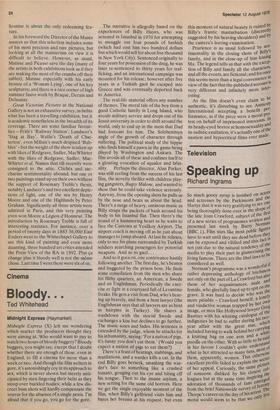Cinema
Bloody...
Ted Whitehead
Midnight Express (Haymarket)
Midnight Express (X) left me wondering which market the producers thought they were aiming at. Who would want to pay to watch two hours of bloody buggery? Bloody buggers, you might say, except that I doubt whether there are enough of those, even in England, to fill a cinema for more than a week or two. And though the film welters in gore, it's astonishingly coy in its approach to sex, which is never shown but merely anticipated by men fingering their belts as they stoop over buckled bodies; while a few discreet bum shots will hardly compensate the voyeur for the absence of a single penis. I'm afraid that if you go, you go for the gore.
The narrative is allegedly based on the experiences of Billy Hayes, who was arrested in Istanbul in 1970 for attempting to smuggle out four pounds of hashish (which had cost him two hundred dollars but which would sell for about five thousand in New York City). Sentenced originally to four years for possession of the drug, he was later re-sentenced to thirty years for trafficking, and an international campaign was mounted for his release; however after five years in a Turkish gaol he escaped into Greece and was eventually deported back to America.
The real-life material offers any number of themes. The moral tale of the boy from a good Catholic family in Long Island, who avoids military service and drops out of his Jesuit university in order to drift around the world, only to end up in the mess that Dad had forecast for him. The Solzhenitsyn angle of the growth of character through suffering. The political study of the hippie who finds himself a pawn in the game being played by Washington and Ankara. The film avoids all of these and confines itself to a gloating evocation of squalor and bilutality. Perhaps the director, Alan Parker, was still reeling from the success of his last film, the novelty thriller with children playing gangsters, Bugsy Malone, and wanted to show that he could take violence seriously. Anyway, from the opening shots he pulls us by the nose and beats us about the head. There's a surge of heavy, ominous music as Billy straps the packets of hash around his body in his Istanbul flat. Then there's the sound of a hammering heart as he waits to face the Customs at Yesilkoy Airport. The airport coach is moving off as he just about manages to jump aboard. At last he relaxes, only to see his plane surrounded by Turkish soldiers searching passengers for potential weapons. And so to gaol. . .
And so it goes on, one contrivance hastily following another. The first day, he's beaten and buggered by the prison boss. He finds some consolation from the men who share his filthy quarters, an American, a Swede and an Englishman. Periodically the exercise or fight in a courtyard full of Levantine freaks. He gets a visit from Dad, who's bearing up bravely, and from a bent lawyer (the Englishman says that all lawyers are as bent as hairpins in Turkey). He shares a washdown with the stocial Swede and exchanges a kiss but declines to go further. The music soars and fades, His sentence is extended by the judge, whom he attacks for his inhumanity, saying: 'For a nation of pigs, it's funny you don't eat them.' (Would you expect a nation of pigs to eat them?) There's a feast of beatings, stabbings, and mutilations, and a warder kills a cat. In the end Billy goes berserk, smashing the warder's face to something like a crushed tomato, gouging out his eye and biting off his tongue. Then to the insane asylum, a new setting for the same old horrors. Here we get the single enjoyable moment of the film, when Billy's girlfriend visits him and bares her breasts at his request; but even
this moment of natural beauty is ruined by Billy's frantic masturbation (discreetly suggested by his heaving shoulders) and by the camera's leering examination. Prurience is as usual followed by sentimentality in the closing shots of Billy's family, and in the close-up of him kissing Ma. The legend tells us that with the exception of Billy and family all the characters, and all the events, are fictional; and for once this seems more than a legal convenience in view of the fact that the published account is very different and infinitely more interesting. As the film doesn't even claim to be authentic, it's disturbing to see AmnestY International accepting a benefit Performance, as if the piece were a moral Protest on behalf of imprisoned innocents. In its beady-eyed horror at homosexuality ana its sadistic exultation, it's actually one of the nastiest and hypocritical films ever made' ..•••■••






























 Previous page
Previous page